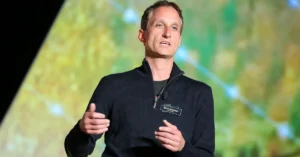Google’s sweeping layoffs in 2023 left thousands of employees reeling after receiving abrupt email notifications, upending their lives and livelihoods. For many long-serving staff members, who had dedicated over a decade to the tech giant, the sudden severance was particularly devastating. Having invested their hearts and souls in the company, these loyal employees struggled to come to terms with the immediate termination of their roles. The shocking move has sparked concerns about job security and the human cost of corporate restructuring.
Nicholas Whitaker, a devoted Google employee since 2010, experienced a stunning and abrupt termination. His ordeal began with a startling 3 am email to his personal address, which he discovered only after a concerned colleague reached out via LinkedIn. “My layoff experience was traumatic,” Whitaker recounted to Business Insider India. He continued, “I got an email at 3 am to my personal email, that I only found because a colleague pinged me on LinkedIn in the DMs to ask if I was ‘Ok’ and if I was ‘safe’.”
Whitaker recalled being oblivious to his impending layoff, assuming his colleague’s concerned LinkedIn message was about a catastrophic event, such as a “shooting or some natural disaster.” However, the reality was far more personal. Upon investigating, Whitaker found himself locked out of his work email, laptop, and phone. It wasn’t until he checked his personal email that he discovered the shocking truth: a “short and impersonal email” informing him that his role at Google had been eliminated.
The mass layoffs at Google in 2023 were marred by controversy, with many criticizing the company’s abrupt and impersonal approach. Employees took a stand, writing an open letter to CEO Sundar Pichai in March 2023, advocating for greater empathy and support during the layoff process.
Whitaker recounted his personal struggle following Google’s sudden layoff notification, which he received via email at 3 am. In the ensuing months, Whitaker found himself mired in bureaucratic formalities, fighting to secure the payments he was rightfully owed.
“It took all of the next several months for me to mail back my laptop, badge and any gear that I had that was Google property. (I also had to) navigate unemployment, health insurance and get all of the documentation I had to submit to “self Offboard” and to receive payments that I was supposed to get.” Whitaker said.
Nicholas Whitaker recalled the frustrating aftermath of his Google layoff, marked by a series of errors and miscommunications from the relevant team. He also expressed disappointment at the complete absence of empathy from his former colleagues. “Along the way there were multiple errors and miscommunications from the team that made it all even more uncomfortable,”
Whitaker noted that aside from a single text message from his prior manager a few days after the layoff, he received no further outreach or support from his old team.
“I got a single text message from my prior manager asking how I was doing a few days after I was laid off, but otherwise no one reached out to check on me or offer assistance from my old team. Overall I found the process to be brutally impersonal and inhumane,” he said.
Despite his traumatic layoff experience, Nicholas Whitaker acknowledged that Google wasn’t always “inhumane” during his tenure. In fact, he recalled some truly exceptional times at the company. Whitaker noted that Google had undergone significant changes since he first joined, evolving into a distinctly different entity. The Google he once knew was a more compassionate and nurturing workplace, a far cry from the impersonal process he faced during his departure.
“My initial experience working at Google was like it was a completely different company. I started as a temp, contractor and then a vendor for Google back in 2010, and at the time I think it was something like 40,000 employees. It had a real startup feel to it. Teams were agile and collaborative, and there was a lot of room for growth. It may have been specific to my team and org, but it felt like you had a lot more room for experimentation and autonomy to make decisions, and failure wasn’t seen as a bad thing, but a necessary part of innovation,” Whitaker recalled.
Nicholas Whitaker revealed that during his time at Google, a palpable “class system” existed, particularly affecting Temporary, Vendor, and Contractor (TVC) employees like himself. “As a TVC you wouldn’t be included in many of the activities and learning opportunities that full-time employees had, and didn’t get invited to extracurricular activities,” he noted.
Whitaker observed that this hierarchy was perpetuated by a cultural bias, often masked by lofty slogans. “There was a real bias towards culture at the time, and words like ‘Don’t be Evil’ and ‘be Googly’ were often used,” he said, highlighting the disconnect between Google’s ideals and the reality faced by TVC staff.
Despite criticizing Google’s treatment of contractors, Nicholas Whitaker acknowledged the company’s positive atmosphere. “Colleagues generally were very supportive, collaborative and encouraging to work with,” he said. His time at Google marked a significant personal and professional growth period. “I was excited as this was my first time working in big tech, or Corporate America and I saw that period of time as a real coming of age for me.” Whitaker appreciated the guidance and support from colleagues and leaders. “I learned how to be a professional at Google and appreciated all of the early guidance and support that I got from colleagues and leaders.”
Whitaker has successfully transitioned to entrepreneurship since his layoff over a year ago, now dedicating his efforts to guiding others through their career paths.
Sharing the catalyst for his new venture, Whitaker revealed, “After 13 years in big tech, the last few years in particular being particularly difficult due to toxic teams and leaders, I didn’t want to jump right back into that kind of experience again. A year before getting laid off, I had experienced a bad mental health crisis that was the result of workplace bullying, gaslighting and toxic leadership.”
“I wanted to help others avoid and recover from similar situations and create a community where people can find mutual support and coaching on how to best navigate their careers in a conscious way. My severance after working so long at Google allowed me to fund the launch of my coaching business, and eventually ‘changingwork.org‘.”
Changing Work, Nicholas Whitaker’s entrepreneurial endeavor seeks to fill a critical gap in corporate life. Its purpose is to help individuals reconnect with their career purpose and foster more conscious leadership and businesses, ultimately transforming the work landscape.
“What makes this so transformative for me personally is that it allowed me to step into a role where I could integrate all the lessons from my own career – especially the parts that were hardest for me. During my time at Google, I saw firsthand how high-pressure environments can lead to burnout, anxiety, and a disconnect from our true selves,” he added.
The tragic death of a young CA at Ernst & Young (EY) in India has sparked outrage, highlighting the toxic work cultures pervasive in high-pressure industries. Social media is abuzz with discussions on burnout, mental health struggles, and unrealistic corporate expectations. This heartbreaking incident underscores the urgent need for companies to prioritize employee well-being and mental health, cultivating sustainable and compassionate workplaces. Nicholas Whitaker’s work, focused on transforming the corporate landscape, has never been more crucial.
Nicholas Whitaker’s Changing Work venture stems from his personal struggles and transformative journey. “I’ve spoken publicly about how mindfulness practice, coaching and therapy literally saved my life during some of my darkest times at Google. Changing Work is the culmination of that journey. It’s not just about helping others find balance and fulfillment—it’s about creating a space where I can live those values every day,” he says, driven to create a better work landscape.






